Another photograph that I am seeing for the first time, of my maternal grandmother Fannie Mae Turner soon to be Graham. Written on the back of the postcard type photograph, it says “Fannie M. Turner before marriage”
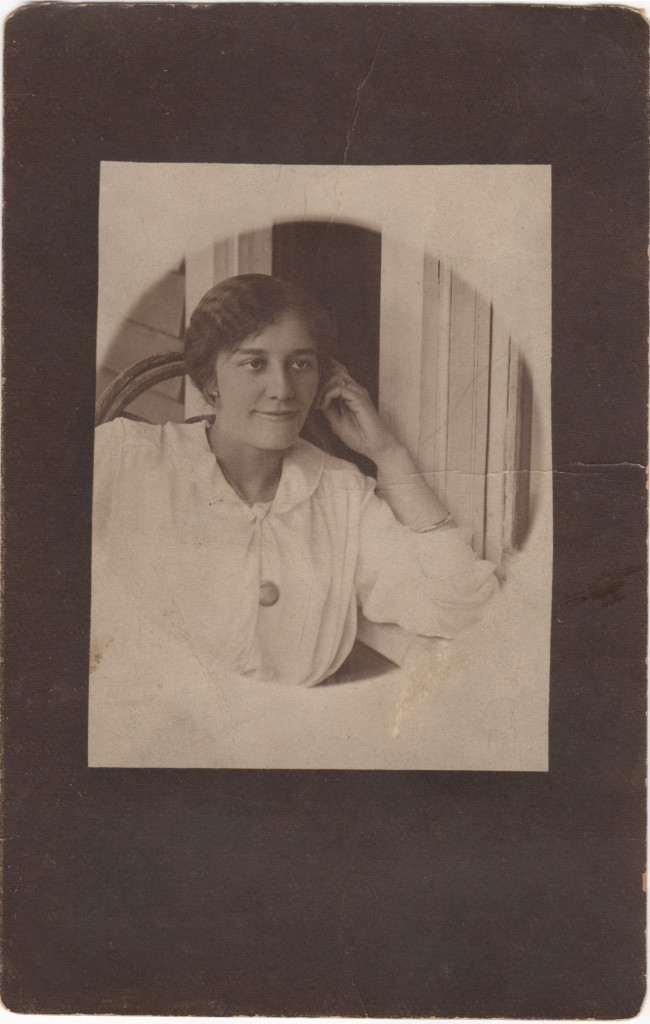


After watching Episode 3 of Many Rivers to Cross in which the Civil War; black soldiers, contraband; freedom; 40 acres and a mule; suffrage and loss of it; the all black town of Mount Bayou, MS; lynching and finally Plessey vs. Ferguson were discussed, it took me a minute to come up with a tie in to my own family history to write about.
I began to think about my 2X Great Grandfather Joe Turner of Lowndes County, Alabama and how important land was to him and how it caused a riff between him and his son, my Great Grandfather Howard Turner. Something we always wondered about was how Joe Turner ended up with land at the end of the Civil War. Someone suggested it must have been Homestead Land. There is no indication that it was. I am going to write about Joe and Emma (Jones) Turner and their land.
As I started organizing materials, I looked to see if I could find any new information. In Mildred Brewer Russell’s book, “Lowndes Court House” on page 127 she says “Prominent Negro politicians during the carpetbag regime were Joe Turner, Oliver Marast, Jasper Cottrell, James Jackson, Tom Cook, Hamp Shuford, Frank Streety, Adam Lundy, Sam Robinson, Jule Cottress, Jerry Cook, Billy Spann, Cyrus Miles, Johnson Rambo, Robert McCord, Hope Harris, John W. Jones, and the three Carson brothers, Hugh, Will and Warren.” I wanted to find a record, another book, something that validates that the Joe Turner mentioned in the book, was my 2X Great Grandfather, Joe Turner.
I had no luck with the politics, aside from his name on a list of registered voters, but within 24 hours I found 2 new documents on Ancestry.com – the 1866 Colored Population Census and an Agricultural Census form for Joe Turner for 1880. Online I found a copy of a court case involving a land case between my 2X great grandfather and his son, my great grandfather.
__________________________
When shots were fired on Fort Sumter and the Civil War began in 1861, Joe and Emma (Jones) Turner were enslaved in Lowndes County, Alabama. I found Joe on the plantation of Wiley Turner but have so far been unable to find Emma and their children.
When the war ended and they were enumerated in the 1866 colored population census, they had 3 children under 10 – my great grandfather Howard who was three years old, his sisters, two year old Fannie and four year old Lydia. Joe and Emma were 25.
In 1870 they were farming. There were two more children, three year old Joe and 10 month old Anna. Neither of the adults could read or write. None of the children were old enough for school. Their personal estate was worth $300.
In the 1880 State Agricultural Census they farmed 76 acres, which they rented for cash. Farm implements and equipment were worth $100. Their livestock was worth $460 and included 2 milch cows; 12 other cattle (seven purchased in 1879 and one that died.); 20 swine; 36 barnyard fowl, who produced 100 eggs in 1879; one horse and four mules. They grew 25 acres of Indian corn, yielding 300 bushels; 50 acres of cotton yielding 12 bales and one acre of sugar cane yielding 48 gallons.
In 1880 US Census 16 year old Howard was clerking in a store. Joe Jr. was 13 and in school. Their sister Fannie no longer appears in the census and perhaps she was married or she may have died. I haven’t found a death record for her, I know that she died young. Several of her brothers named their daughters for her. My grandmother Fannie Mae Turner, was named for her Aunt Fannie. But that is getting ahead of myself. Another son, seven year old Alonza Turner, had joined the family since 1870.
Howard Turner and Jennie Virginia Allen were married in June of 1887. My mother told me this story: Howard’s father, Joe Turner, gave them land to farm in Lowndes County, Alabama. Joe wanted the land to stay in the family forever. By 1890 Joe and Howard were arguing constantly about Howard and Jennie’s desire to sell the land and move to Montgomery. The day of the fateful barbecue, the arguments had been particularly violent. Jennie was in Montgomery visiting her parents with their two young daughters when word came that Howard had been shot dead at the barbecue.
According to the court record, Joe and Howard had agreed to purchase some land together. They both promised to pay an equal share. When it came time to pay, Howard refused and Joe paid all of it. In 1890, my 2X great grandfather, Joe took Howard to court to recover his money. During the trial, Howard died. His youngest child, Daisy, was not yet one year old. The Court case against Howard was revived against his heirs and the Court ordered Howard’s interest in the land sold to pay the lien Joe had gotten in the Chancery decree in 1897.
In 1915 Daisy Turner brought a case before the Alabama Supreme Court to ask that she receive her inheritance from the sale of the land the original case concerned. By that time, 15 years had passed. Joe and Howard Turner were both dead. Joe’s second wife had moved to Montgomery with their children. Daisy lost her case. I think because her father hadn’t paid for his share of the land and so there was nothing to inherit. It seems that the land was sold after the first case. I will have to see if I can find the records of that case.
By 1900 Joe owned his own farm, although it was mortgaged. Emma could read and write, although Joe could not. She had given birth to 10 children. Only 3 were still living, Joe Jr., Alonzo and Lydia. Lydia’s two children, Anna Lisa and Joseph Davis, were enumerated with their grandparents.
Emma (Jones) Turner died around 1901. In 1902 Joe Turner, who was then 60 years old, married Luella Freeman who was 29 years old. He continued to farm and they had 9 children before he died at about age 80 in 1919. By 1930 Luella and most of her children were living in Montgomery. They ended up in Chicago, Illinois.I hope the land went to one of the older boys but I don’t think so.
Other posts I’ve written about this series:
Stolen from Africa
Escape – Dock Allen
Joe Turner – Land, Mules and Courts.
Hastings Street, Detroit 1941.

Angela Walton-Raji of the blog My Ancestor’s Name suggested that tonight we observe Watch Night by naming our ancestors who were born into slavery but lived to see freedom. I decided to join her.
I have no photograph of Annie Williams (mother of Eliza Williams Allen) who was born about 1820 in Virginia and died after 1880 in Montgomery, Alabama.
I do not have a photograph of Matilda Brewster (mother of Dock Allen) who was born in Georgia.
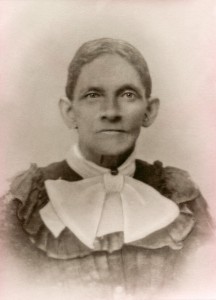
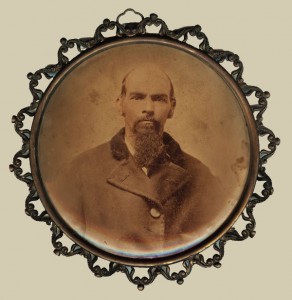
Eliza Williams Allen was my great great grandmother. She was born in Alabama about 1839 and died free in Montgomery, Alabama in 1917. She was a seamstress. You can read more about Eliza here A Chart of the People in Eliza’s Life and Eliza’s Story – Part 1 with links to the other 3 parts.
Dock Allen was my great great grandfather. He was born a slave in Georgia about 1839 and died free in Montgomery, Alabama in 1909. He was a cabinet maker. You can read more about Dock Allen here Dock Allen’s Story.
I have no photographs of my great grandparents William Graham who was born about 1851 or his wife Mary Jackson Graham born about 1856. Both were born in Alabama and died dates unknown. William Graham was a farmer. They were my grandfather Mershell C. Graham’s parents. I know very little about them but I have been gathering information which I will post soon.
I do not have photographs of my grandmother Fannie Mae Turner Graham’s paternal grandparents. Her grandfather Joseph Turner was born in Alabama about 1839. He died in Lowndes County, AL in 1919. He was a farmer and owned his own land. His wife Emma Jones Turner was born about 1840 in South Carolina and died about 1901 in Lowndes County Alabama. You can read more about them here, Emma and Joe Turner of Gordensville, Lowndes County, Alabama.
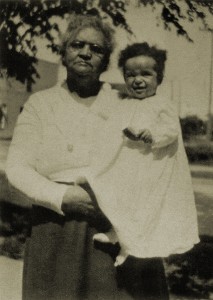
Frank Cleage was born around 1816 in North Carolina. He was enslaved on the plantation of first Samuel Cleage and then his son Alexander Cleage. I do not have a picture of Frank Cleage and have no stories about him. His name appears on my great grandfather, Louis Cleage’s death certificate.
In the 1870 Census he was living with his wife, Judy and six children, including my great grandfather, in Athens, Tennessee. I also have a marriage record for Frank and Judy dated 20 August, 1866. I don’t know if they were married before and the children are theirs or if they came together after slavery. Judy was born about 1814.
Frank is mentioned in a work agreement between Samuel Cleage and his overseer in this post – Article of Agreement – 1834.
They were both born in slavery and lived most of their lives as slaves but they lived to see freedom and to see their children free.
No photograph of Louis Cleage B. 1852 in Tennessee and died 1919 in Indianapolis, IN. Louis and Celia were my grandfather Albert B. Cleage’s parents. Louis was a laborer. You can read more about Louis Cleage here – Lewis Cleage – Work Day Wednesday.
Celia Rice Cleage Sherman was born into slavery about 1855 in Virginia. She died about 1931 in Detroit, Michigan. She was a cook. You can read more about Celia Rice Cleage here Celia Rice Cleage Sherman.
I do not have photographs of my great grandmother Anna Allen Reed who was born about 1849 in Lebanon, Kentucky and died in 1911 in Indianapolis, Indiana. She was my grandmother Pearl’s mother.
Anna’s mother Clara, my great great grandmother, was born 1829 in Kentucky and died after 1880 in Kentucky. I need to write them up. You can see some of their descendents here My Father’s Mother’s People.
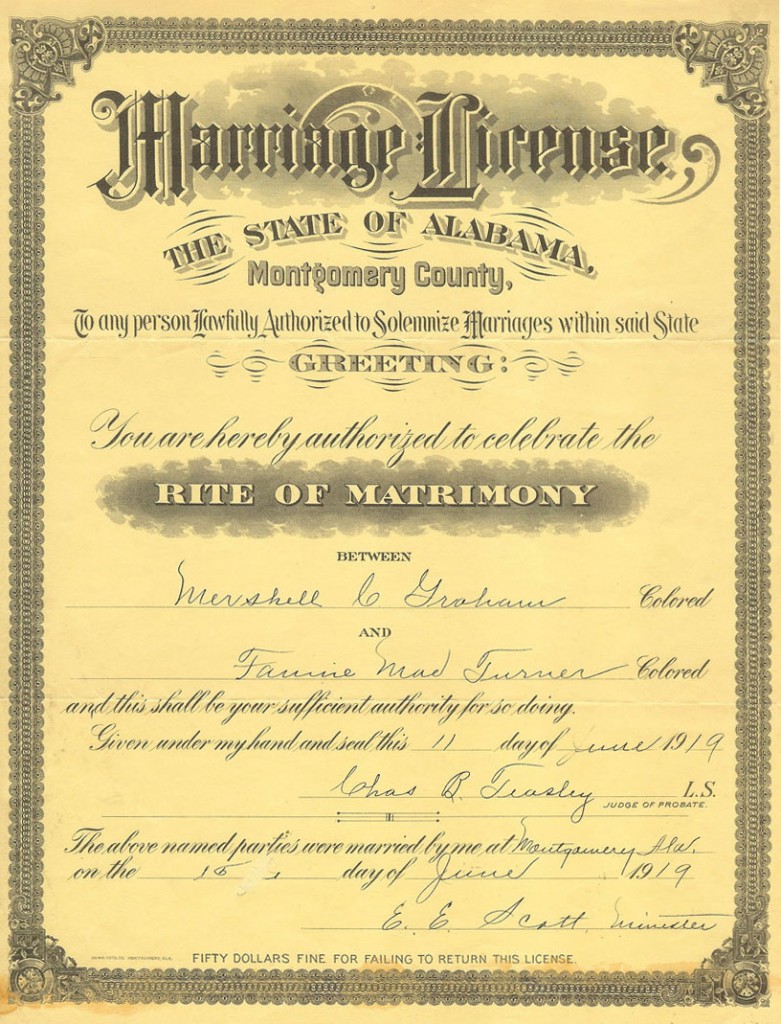
On June 11, 1919 Mershell Graham and Fannie Mae Turner applied for a marriage license in Montgomery, Alabama. They were married by Rev. E.E. Scott at First Congregational Church in Montgomery on June 15. I have no photographs of the marriage or memories that were handed down. I could find no record of their marriage license in the Montgomery Advertiser. They seemed to have no section devoted to “News of the Colored Folk” as some newspapers did.
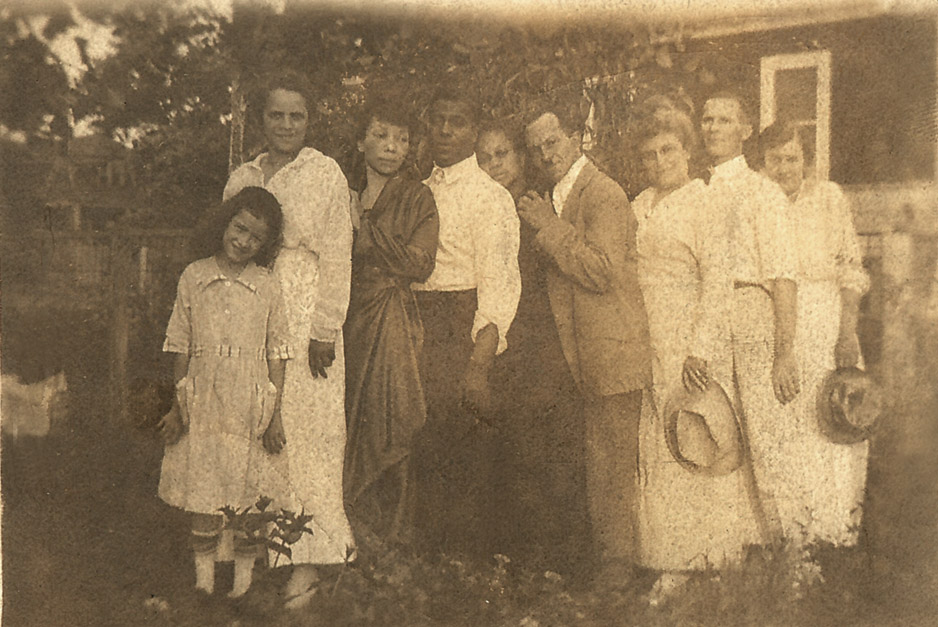
Soon after the ceremony my grandparents left and returned to Detroit where Mershell was working. I assume they took the train, which would have been segregated at that time. They roomed with friends from home, Moses and Jean Walker. There were other roomers, all of them saving up to be able to purchase their own homes.
To read Mershell’s letter of proposal read The proposal To read Fannie’s letter of acceptance read – The acceptance
I found several marriage related, handwritten poems in my grandparents papers and have printed them below. I wonder if they read these during the ceremony or exchanged them.
The gift
Yes, take her and be faithful, still, and may your bridal bower,
Be sacred kept in after years, and warmly breathed as now,
Remember tis no common tie that binds your youthful hearts
Tis one that only truth should breath and only death should part.
Remember tis for you she leaves her home and mother dear,
To have this world with you alone, your good and ill to share,
Then take her and may future years mark only joys increase
And may your days glide sweetly on in happiness and peace.
Soon, soon I’ll go – from those I love
You, Mother, Sister, among the nest,
Where I will often think of you,
Far in the distant west.
Farewell, Mother, though I leave you
Still I love you, Oh! believe me
and when I am far away
Back to you my thoughts will stray.
Oft, I’ll think of you and home
Though in other lands I’ll roam.
Yes, though miles may intervene,
I will keep thy memory green
Mother, sister, from my heart
Thoughts of thee shall never depart.

In 1940 my 75 year old great grandmother, Jennie Virginia Turner, lived with her daughters at 4536 Harding, Detroit, Michigan. She lived about 10 minutes by car (not that they had a car) from her oldest daughter, Fannie Graham and her family on Theodore. Her nephew, James Edward McCall, lived about half way between the two with his family on Parker. She was listed as a widow and retired with 6 years of schooling. Everyone in the house is identified as “Negro”. Jennie gave the enumerator the information.
Aunt Daisy was 48 years old, single, with 4 years of high school. She was the only one in the house working outside of the home. She is listed as a stock girl at a retail fur company. It had been my understanding that Daisy was a seamstress but she was also listed as head stock girl at a fur store in the 1930 census so I guess she wasn’t sewing. My mother told me years ago that Daisy also collected numbers at Annis to supplement the family income. When she lived in Montgomery, AL, Daisy was a teacher for several years and worked in her Uncle Victor Tulane’s grocery store as a clerk.
Aunt Alice was 32 years old, single and had completed 9 years of school. This answered a question I had about Alice, did she finish high school after she moved to Detroit at age 15. I don’t think she did. If she started school at 6, she probably stopped when she moved to Detroit.

What education did your mother receive? Your grandmothers? Great-grandmothers? Note any advanced degrees or special achievements.
On My Maternal Side
My 3X great grandmother, Annie Williams, was born about 1820 in Virginia into slavery. According to the 1880 Census, when she was about 60, she spoke English and could not read or write.

Her daughter, my 2X great grandmother, Eliza Williams Allen, was born in Alabama about 1839 into slavery. She was freed by 1860. According to the 1910 census, she was about 67, spoke English and could not read or write
Her daughter, my great grandmother, Jennie Allen Turner was born free in Montgomery, Alabama in 1866. According to the 1880 Census, she was 13 years old, had attended school in the past year, spoke English and was literate. I found one of my favorite books at her house “Lydia of the Pines.”
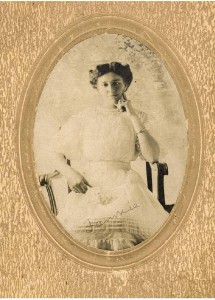
Her daughter, my Grandmother Fannie Mae Turner Graham, was born in 1888 in Lowndes County, Alabama. She grew up in Montgomery. According to the 1900 census, she was 11 years old, at school, spoke English and was literate. My mother told me that when Fannie graduated from high school – State Normal, was offered a scholarship to Fisk but refused it and took a job in her uncles store, which she managed until she married in 1918. Also according to my mother, Fannie could quickly add long columns of numbers in her head.
My mother , Doris Graham Cleage, was born in Detroit in 1923. She graduated from Eastern High School in Detroit and received a full scholarship to Wayne State where she earned a BA with distinction as a Sociology major in June/1944. She returned to school in 1951 and earned teaching certification. In 1958 she became a masters candidate in education, completing her Master’s of Education Degree in the fall of 1958. She took postmasters classes in education during a sabbatical in 1963. She also took evening classes in 1968, when I was a senior at Wayne State.
My great grandmother, Emma Jones Turner (My grandmother Fannie’s paternal grandmother) was born about 1840 in South Carolina into slavery. According to the 1880, 1900 and 1910 census she spoke English and was literate. I wish I knew more about her. I never heard a story about her. After my grandmother’s father was killed when she was 4 years old, her mother broke all ties with her husband’s family.
On My Paternal Side
My great grandmother Celia Rice Cleage Sherman was my grandfather’s mother. She was born about 1855 into slavery in Virginia and brought to Tennessee as a child. She was about 10 when freedom came. In the 1880 census she could neither read nor write. By the 1930 census she spoke English and could read but could not write. I wonder if my grandfather or his siblings taught her to read when they went to school.
My 2X great grandmother, Clara Green was born into slavery about 1829 in Kentucky. She was my grandmother Pearl Reed Cleage’s grandmother. In the 1880 census she was listed as about 55, spoke English and could not read or write.
Her daughter, my great grandmother Anna Allen Reed was born about 1849 in Kentucky into slavery. According to the 1910 Census she spoke English but could not read or write. Anna’s four older children were illiterate while the four youngest were literate.
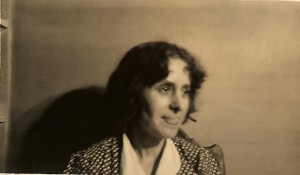
Her youngest daughter, my grandmother Pearl Reed Cleage was born in Lebanon, Kentucky in 1886. In the 1900 census she was 16 and where it says if you were or were not in school it says “Book 1” I don’t know what that means. At any rate she was literate and spoke English. My Aunt Barbara told me she finished high school. I remember my grandparent’s house being full of books.
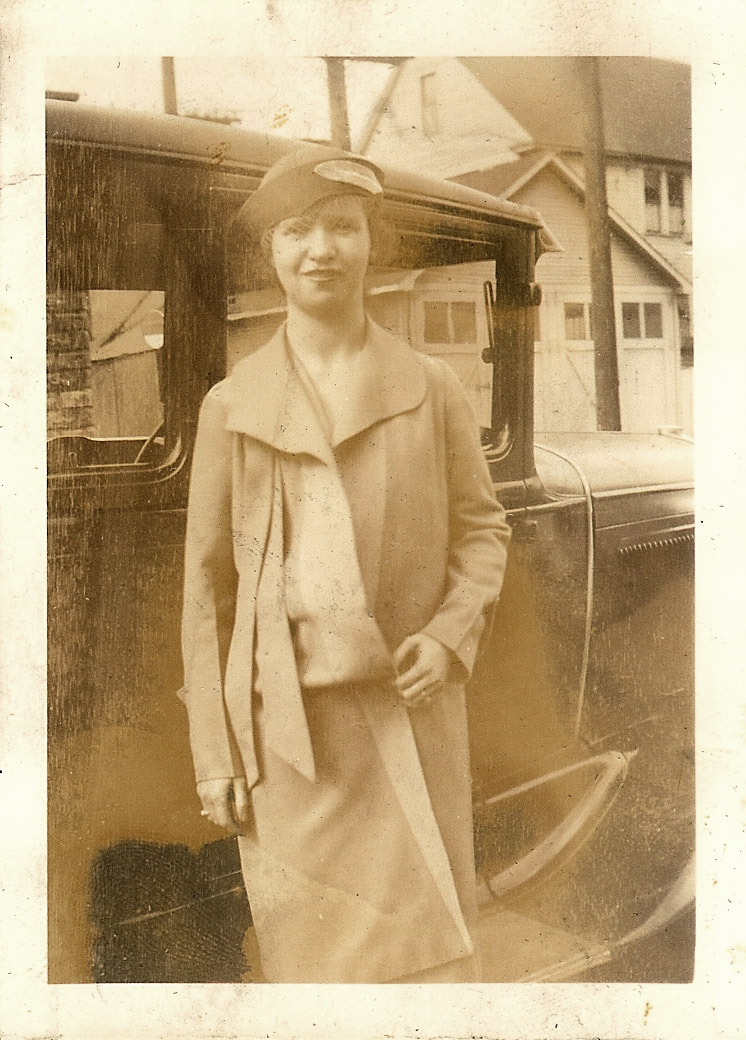
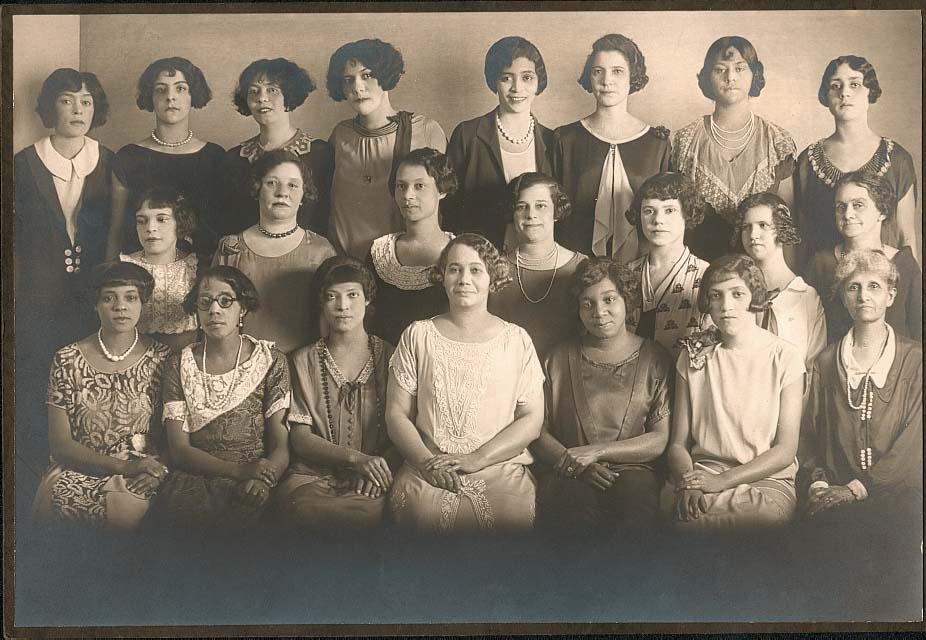
The staff at Annis Furs in Downtown Detroit. Taken in the 1920’s. My great grandmother, Jennie Virginia Allen Turner is in the second row, far left. Her daughter Alice is next to her. Skip the next woman and her daughter Daisy is there, 4th from the left. The three of them got jobs at Annis Furs soon after moving to Detroit from Montgomery, Alabama in 1922. I remember a little teddy bear Daisy made for my younger cousin Marilyn Elkins out of scraps of real fur. To read more about my Great Grandmother Turner, click Jennie Virginia Allen Turner.
Above is a photograph from the Burton collection at the Detroit Public Library. The Annis Fur Company is in the corner building. Although this was taken in 1917 I think the area looked pretty much the same 7 years later. To see a photograph of the Woodward Ave in 1910 click at Shorpy. You can see Annis Fur Post and Grinell Bros Pianos on the left, looking down the crowded street, past the Eureka Vacuum sign.
For more photos of crowds of women and other fascinating subjects, click Sepia Saturday.
I posted this chart last year for Labor Day. Here is a chart showing 7 generations of workers from my 3X great-grandmother to my children. My direct line is highlighted in yellow. The women with children combined whatever else they did with cooking, cleaning, washing clothes and raising the children. The first generations started their work life as slaves in Alabama. You can see a similar chart for my paternal side HERE.
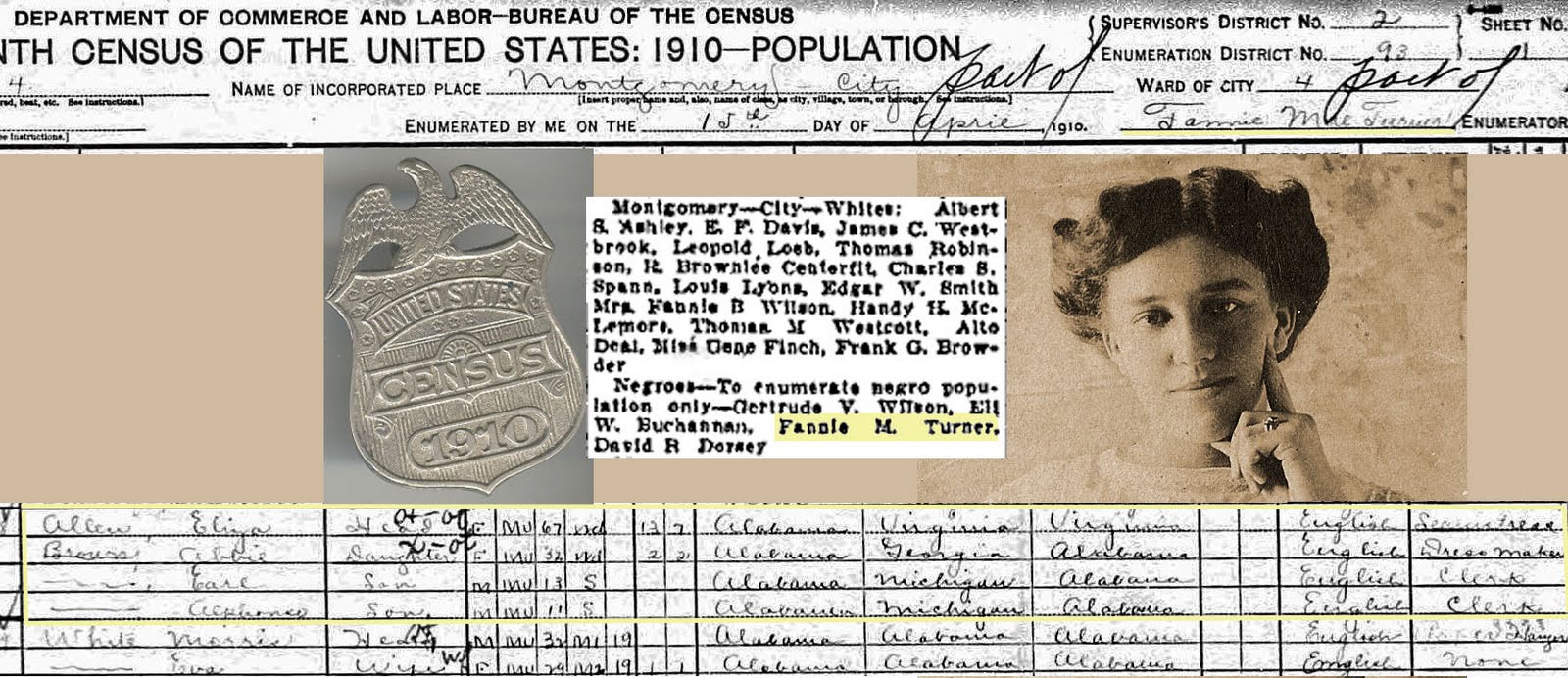
After reading My Grandfather was an Enumerator on the blog ABT UNK, I decided to write something about my grandmother Fannie M. Turner who was an enumerator for the 1910 US Census in Montgomery, Alabama. She was 22 and lived with her mother and younger sisters in Montgomery, although not in the district she enumerated. Her grandmother Eliza Allen lived in the district. It was looking at the entry for Eliza that I first noticed that my grandmother was the enumerator. Recently I found a newspaper article online about the appointed census takers that said in part:
“Montgomery – City – Whites: Albert S. Ashley, E.F. Davis, James C. Westbrook, Leopold Loab, Thomas Robinson, R. Brownlee Centerfit, Charles S. Spann, Louis Lyons, Edgar W. Smith, Mrs. Fannie B. Wilson, Handy H. McLemore, Thomas M. Westcott, Alto Deal, Miss Gene Finch, Frank G. Browder. Negroes–To enumerate negro (sic) population only–Gertrude V. Wilson, Eli W. Buchanan, Fannie M. Turner, David R. Dorsey.”
Fannie M. Turner began work April 15, 1910 and enumerated her Aunt Abbie and her Grandmother Eliza on pg 2. She finished on April 26. Mrs. Fannie B. Wilson (white) completed the enumeration of Montgomery, Ward 4 by counting the white residents on several pages after that. As noted in the newspaper article, Negro enumerators could only count Negros. I wonder how that worked. Did my grandmother go to the door, note that they were white and tell them someone else would return to count them later? Did the neighbors alert her? Since she was already familiar with the neighborhood, did she already know where the white people lived or did all the white residences live in the same area?
My grandmother was a working woman who managed her Uncle Victor’s grocery store from the time she graduated from State Normal School until she married my grandfather in 1919. Wish I knew the stories she must have had to tell about that two weeks of counting the citizens in Ward 4.